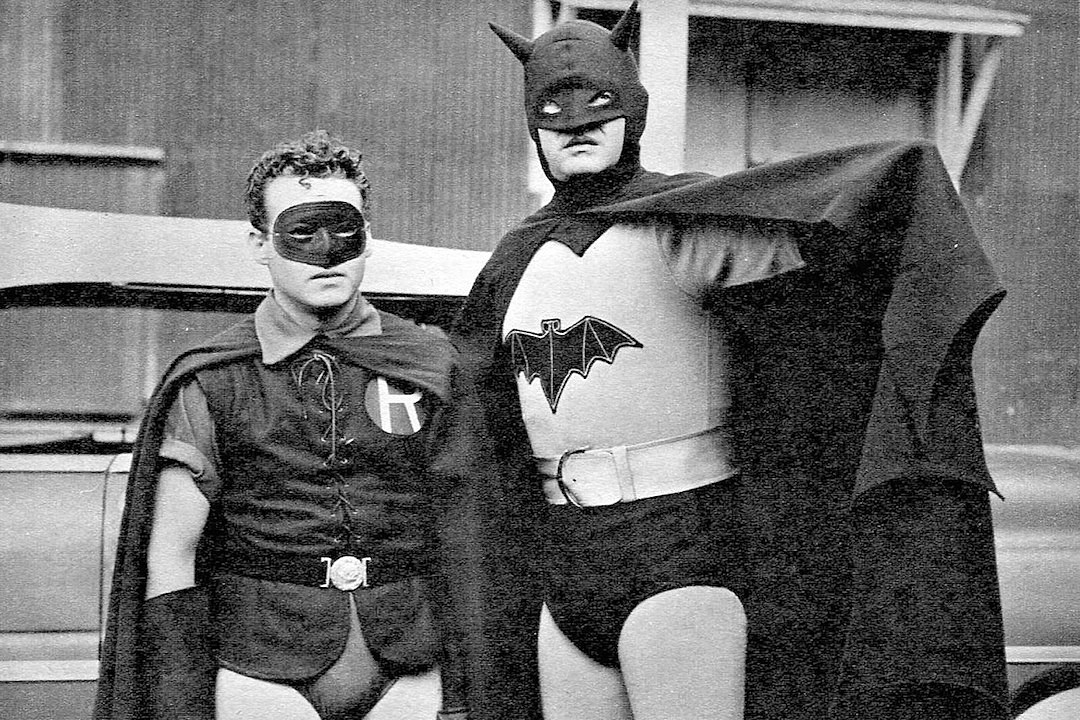 The first big-screen Batman - Lewis Wilson in 1943, with Douglas Croft as Robin.
The first big-screen Batman - Lewis Wilson in 1943, with Douglas Croft as Robin.
It was dated May 1939, but actually hit newsstands in March that year. Batman made his screen debut in 1943 - see the somewhat saggy long underwear at right, and then took a two decade break till the campy TV series of the mid-Sixties.
Another twenty years later he returned in a feature film by Tim Burton, and has been a fixture at the multiplex ever since. I was trying to recall whether I'd ever met anyone who's played Bruce Wayne, and to the best of my recollection I haven't. But I've met a couple of Alfreds, the butler at Wayne Manor, which on reflection I think is cooler.
Michael Gough was a fine actor who found fame late in life as the longtime major domo at Wayne Manor. Michael Caine, who succeeded him as Alfred, was a starrier name, and a very genial cove when he and the lovely Shakira swung by our table when I was dining with Conrad Black during his trial in Chicago in 2007.
(Sir Michael was in town filming The Dark Knight.) But Gough was more suited to the role, and it's partly because of him that, to mark eighty years of the caped crusader, we're focusing on those Batman pictures of the late Eighties and Nineties.
It's hard to remember now, but back in 1989 everyone raved about how the Tim Burton Batman was wonderfully "dark" after the campy Sixties TV version. Twenty years later Christopher Nolan's version made Burton look like Mel Brooks, but Nolan's "dark knight" will wind up as the camp crusader sooner or later. It seems to be an inevitable trajectory for the franchise.
One consequence of "darkening" Batman is that it makes him rather dull - and the villains tend to become rather more lurid and vivid. What do you remember about Burton's first Batman? Jack Nicholson's star turn as the Joker. Batman Returns? Michelle Pfeiffer's Catwoman, even though her mask didn't fit. A few months afterwards, I remember passing a store window with a huge poster: "BATMAN RETURNS THE VIDEO." And I thought: who can blame him?
For Batman Forever, Batman returned the suit. Michael Keaton figured why get wiped out by Jim Carrey as the Riddler, put in for his Bat-pension and passed the cape and cowl to Val Kilmer. The tone is set by the first lines. Michael Gough's Alfred inquires, as Batman leaps into his Batmobile, whether Sir would care to take a sandwich with him. "I'll get drive thru," says the caped crusader. Ha-ha.
As the series got campier, Michael Gough came to seem more crucial. What was it they said about Ginger Rogers and Fred Astaire? She gave him sex and he gave her class? So too for Batman and Alfred. Anyone can be a butler in a Merchant-Ivory/Richard Curtis/Downton Abbey-type deal. But to be the butler while everyone else around you is running around in Sharpie-colored long underwear, how cool is that? All the best scenes in Batman Forever go to Alfred, a father-confessor gently trying to instil a little romantic confidence in the hapless Master Bruce. You can't blame Gotham City's alleged playboy if the Bat-tering ram in his utility belt isn't exactly rising to the occasion. The love interest is Nicole Kidman as a psychiatrist called Chase Meridian, which sounds like a corporate merger too far. But Gough almost makes you believe Bruce and Chase are for real.
The final entry in the series couldn't even manage star villains, only star underwear. By the Nineties, the saggy polyester of the TV show had given way to rubberized body armor, and both superheroes and supervillains spent half their time swapping inside leg measurements. "Let me guess," says Poison Ivy in Batman & Robin. "Size 50 from Big & Tall?"
"Actually, I wear a size smaller," says Mr Freeze. "It makes me look slimmer." For a respected botanist turned toxic eco-psycho bent on world domination, Poison Ivy is curiously fixated on her opponents' threads, noting approvingly that Batman's rubber suit is "anatomically correct". She later describes herself as an "action figure", a worrying sign that not only do this new generation of superheroes look like their toy-doll merchandising tie-ins, they think of themselves that way, too.
So does the director, Joel Schumacher. The opening sequence is full of loving close-ups of his heroes' Bat-butts and Bat-codpieces. Inevitably, when Barbara, Alfred's niece, shows up on a break from her studies at England's prestigious "Oxbridge Academy", her main interest in becoming Batgirl is the costume. "Suit me up!" she begs Uncle Alfred. Interestingly, both Batman's and Robin's outfits come complete with erect rubber nipples. At first, I assumed this was merely confirmation of Mr Freeze's awesome powers, but later, when Batgirl appears, her suit is a nipple-free zone. Maybe it's only the guys who find the rubber a turn-on.
Given their sartorial preoccupations, we were surely only a sequel or two away from Batman Attends The Spring Collections, where he's forced to do battle with John Galliano and Vivienne Westwood. Alas, Batman & Robin had to make do with Freeze and Ivy, a pair of supervillains so dreary Gotham City is mainly in danger of being bored to death. The ice-cold Freeze and the toxically seductive Ivy have an obvious symmetry, but they're one-trait characters and, as realised by Arnold Schwarzenegger (top billed) and Uma Thurman, barely pass muster on that level. (For Freeze, this latest casting is quite a comedown: in the Sixties television show, he was played by George Sanders.) As the embittered molecular biologist, Schwarzenegger clanks around in a cumbersome icy white suit (stalactights?) as if weighed down by his salary. Thurman plays Ivy with an amateur-hour Mae West accent. Despite her topical concern for the way man is abusing the earth — "Batman and Robin," she sniffs, "the militant arm of the warm-blooded oppressors" — there's a faintly desperate, barrel-scraping air to their scheming. Schumacher attempts to oomph things up by showing us Gotham City's loucher side but even the big party scene — a sort of Carmen Miranda night at Studio 54 — falls flat.
Instead, the picture is quietly stolen by Michael Gough. He never got above-the-title billing, but through four Bat-movies he was happy to play Wayne Manor's doddery old retainer - and, given that he probably got less money than Schwarzenegger's personal hair-stylist, that's doubtless the best description of his paycheck, too. But in the final outing, he emerges as the linchpin of the film, the actor who gives this merchandising franchise what humanity it has and makes real screenwriter Akiva Goldman's theme of family and trust. Alfred is slowing dying of "MacGregor's Disease", though quite what this is is never made clear — possibly a desire to get back to good character roles with the Royal Shakespeare Company. But his illness brings his niece Barbara to Wayne Manor and prompts Bruce Wayne and his ward Dick Grayson to examine their own relationship.
As Barbara/Batgirl, Alicia Silverstone is sweet, plucky and girlish; as Dick/Robin the Boy Wonder, Chris O'Donnell is a lippy brat, forever whining. "I want a car," he demands. "Chicks dig the car."
"This is why Superman works alone," sighs Batman. After the brooding self-doubt-riddled Michael Keaton and the pouting sourpuss Val Kilmer, George Clooney dons the Batsuit, the closest in a generation to the blandly parodic manliness of Adam West on television. In a way, that's all you can do with the part. "Julie, I'm not the marrying kind," he tells his companion (Elle MacPherson). "There are things about me you wouldn't understand." Strangely enough, the less you try to understand them, the easier they are. This team — Clooney, O'Donnell, Silverstone — are all actors of limited range, yet seem absolutely right. But they're fortunate in having Gough's Alfred to infuse their scenes together with the vague sense of something deeper. You don't tremble when Mr Freeze threatens to destroy Gotham, but you just might when Bruce Wayne tells Alfred, "I love you, old man."
Sign up for the daily JWR update. It's free. Just click here.
(COMMENT, BELOW)
Mark Steyn is an international bestselling author, a Top 41 recording artist, and a leading Canadian human rights activist. His latest book is "The Undocumented Mark Steyn: Don't Say You Weren't Warned". (Buy it at a 43% discount by clicking here or order in KINDLE edition at a 50% discount by clicking here. Sales help fund JWR)


 Contact The Editor
Contact The Editor
 Articles By This Author
Articles By This Author